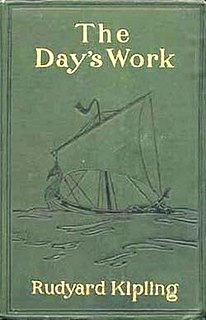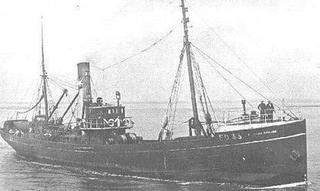Related Research Articles

Joseph Rudyard Kipling was an English journalist, short-story writer, poet, and novelist. He was born in British India, which inspired much of his work.

Kim is a novel by Nobel Prize-winning English author Rudyard Kipling. It was first published serially in McClure's Magazine from December 1900 to October 1901 as well as in Cassell's Magazine from January to November 1901, and first published in book form by Macmillan & Co. Ltd in October 1901. The story unfolds against the backdrop of the Great Game, the political conflict between Russia and Britain in Central Asia. The novel popularized the phrase and idea of the Great Game.

The Jungle Book (1894) is a collection of stories by the English author Rudyard Kipling. Most of the characters are animals such as Shere Khan the tiger and Baloo the bear, though a principal character is the boy or "man-cub" Mowgli, who is raised in the jungle by wolves. The stories are set in a forest in India; one place mentioned repeatedly is "Seonee" (Seoni), in the central state of Madhya Pradesh.

Just So Stories for Little Children is a 1902 collection of origin stories by the British author Rudyard Kipling. Considered a classic of children's literature, the book is among Kipling's best known works.

Clinker built is a method of boat building where the edges of hull planks overlap each other. Where necessary in larger craft, shorter planks can be joined end to end, creating a longer strake or hull plank. The technique originated in Scandinavia, and was successfully used by the Anglo-Saxons, Frisians, Scandinavians, typically in the vessels known as cogs employed by the Hanseatic League. Carvel construction, where plank edges are butted smoothly, seam to seam, supplanted clinker construction in large vessels as the demand for capacity surpassed the limits of clinker construction..

The Light That Failed is the first novel by the Nobel Prize-winning English author Rudyard Kipling, first published in Lippincott's Monthly Magazine in January 1891. Most of the novel is set in London, but many important events throughout the story occur in Sudan and Port Said. It follows the life of Dick Heldar, an artist and painter who goes blind, and his unrequited love for his childhood playmate, Maisie.
".007" is a short story by Rudyard Kipling. It is a story in which steam locomotives are characters, somewhat like the later, better-known tales of The Railway Series by Wilbert Awdry and his son.

Puck of Pook's Hill is a fantasy book by Rudyard Kipling, published in 1906, containing a series of short stories set in different periods of English history. It can count both as historical fantasy – since some of the stories told of the past have clear magical elements, and as contemporary fantasy – since it depicts a magical being active and practising his magic in the England of the early 1900s when the book was written.

The Day's Work is a collection of short stories by Rudyard Kipling. It was first published in 1898. There are no poems included between the different stories in The Day's Work, as there are in many other of Kipling's collections.
"The Rescue of Pluffles" is a short story by Rudyard Kipling. Its first appearance in book form was in Kipling's first collection of short stories, Plain Tales from the Hills (1888); it was first published in the Civil and Military Gazette on November 20, 1886. It centres on Mrs Hauksbee, and begins
Mrs. Hauksbee was sometimes nice to her own sex. Here is a story to prove this; and you can believe just as much as ever you please.
"Lispeth" is a short story by Rudyard Kipling. It was first published in the Civil and Military Gazette on 29 November 1886; its first appearance in book form was in the first Indian edition of Plain Tales from the Hills in 1888, and it later appeared in subsequent editions of that collection. The tale is an interesting example of Kipling's attitudes to different races and cultures, which is less simple than many accounts of his beliefs allow.
"Yoked with an Unbeliever" is a short story by Rudyard Kipling. It was first published in the Civil and Military Gazette on December 7, 1886, and in book form in the first Indian edition of Plain Tales from the Hills in 1888. It also appears in subsequent editions of that collection.

Wee Willie Winkie and Other Child Stories is a collection of short stories by Rudyard Kipling.

The Rudyard Kipling was a British steam trawler launched in 1920 that undertook fishing operations off the coasts of Great Britain and Ireland for almost 20 years. On 16 September 1939, shortly after the outbreak of World War II, the trawler was captured 40 miles (64 km) west of Clare Island by the German submarine U-27. After removing food, equipment, and the crew from the ship, the Germans sunk her with the use of scuttling charges. Several hours later the crew of the Rudyard Kipling were cast adrift 5 nautical miles (9.3 km) off the coast of Ireland. They eventually landed their lifeboats at Killybegs.

The Sparrow-Hawk was a 'small pinnace' similar to the full-rigged pinnace Virginia that sailed for the English Colonies in June 1626. She is the earliest ship to participate in the first decades of English settlement in the New World to have survived to the present day.
"The Devil and the Deep Sea" is a short story by the British writer Rudyard Kipling, first published in 1895 in The Graphic's Christmas number. It was collected with other Kipling stories in The Day's Work (1898).

"Bread upon the Waters" is a short story by Rudyard Kipling, which first appeared in the London Graphic in December 1895. It was later published in The Day's Work (1898). The title derives from Ecclesiastes 11:1 - "Cast thy bread upon the waters: for thou shalt find it after many days". It was originally illustrated by Sir Frank Brangwyn.
"McAndrew's Hymn" is a poem by English writer Rudyard Kipling (1865-1936). It was begun in 1893, and first published in December 1894 in Scribner's Magazine. It was collected in Kipling's The Seven Seas of 1896.
"The Mary Gloster" is a poem by British writer Rudyard Kipling (1865-1936). It is dated 1894, but seems to have been first published in his 1896 collection The Seven Seas.

Fusi Yama was a composite barque ship of roughly 556 tons, built in 1865 by Alexander Stephen & Sons at Glasgow for Killick Martin & Company, London.
References
- ↑ "The Ship that Found Herself The New Readers' Guide to the works of Rudyard Kipling, accessed 1 June 2014.
- ↑ It is explained in the story that "the stringers... are long iron girders that run lengthways from stern to bow".
- ↑ It is explained in the story that "the garboard-strake is the lowest plate in the bottom of a ship".
- ↑ General Preface Just So Stories for Little Children, by Rudyard Kipling, edited by Lisa Lewis. Oxford World's Classics, accessed 1 June 2014.